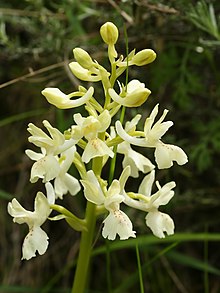Orchideae is a tribe of orchids in the subfamily Orchidoideae. Historically, it was divided into 2 subtribes, Orchidinae and Habenariinae. The subtribe Orchidinae alone contains about 1,800 species.[1] However, although some phylogenetic studies have established the monophyly of the subtribes, the generic boundaries are unclear, with many genera as traditionally circumscribed being paraphyletic or even polyphyletic.[2] Species of genera such as Habenaria and Platanthera have been placed into both subtribes.[3] A 2017 molecular phylogenetic study found that both subtribes did form clades, but did not formally recognize Habenariinae, because of missing genera and uncertainty over generic boundaries.[1] The Asian species of Orchideae, in particular, have been subject to repeated changes of generic placement from 2012 onwards.[3][2][4][5][6][1]
| Orchideae | |
|---|---|

| |
| Flower of Orchis provincialis | |
| Scientific classification | |
| Kingdom: | Plantae |
| Clade: | Tracheophytes |
| Clade: | Angiosperms |
| Clade: | Monocots |
| Order: | Asparagales |
| Family: | Orchidaceae |
| Subfamily: | Orchidoideae |
| Tribe: | Orchideae (Dressler & Dodson) Verm. (1977) |
| Subtribes | |
| |
As of 2017, Orchideae is divided into 6 subtribes: Brownleeinae, Pachitinae, Huttonaeinae, Orchidinae, Coryciinae, and Disinae.[7]
Subtribes edit
Once divided into the Orchidinae and Habenariinae[8] (a nonsystematic paraphyletic splitting), the Orchideae now comprise 6 subtribes.[9][7] Along with previous molecular studies, Chase et al's 2015 analysis confirmed that Diseae was a polyphyletic grouping. Consequently, the former subtribes of Diseae have been redistributed within the Orchideae (for instance, Satyrium is now classified in the Orchidinae). In his 2015 study Chase recommended further study of historically problematic genera in the former Diseae such as Huttonaea and Pachites. Further molecular analysis by Chen et al. in 2017 led to the following reorganization:[10][7]
Genera edit
Genera included in a 2017 molecular phylogenetic study are listed below. As noted above, some generic boundaries remain uncertain; Habenaria in particular is not monophyletic.[1]
- Anacamptis
- Benthamia
- Bonatea
- Brachycorythis
- Chamorchis
- Cynorkis
- Dactylorhiza
- Diplomeris
- Galearis s.l. (including Aceratorchis, Amerorchis and Neolindleya)
- Gennaria
- Gymnadenia (including Nigritella)
- Habenaria (not monophyletic)
- Hemipilia (including a few species previously assigned to Amitostigma and Ponerorchis)
- Herminium
- Himantoglossum
- Hsenhsua
- Neotinea
- Ophrys
- Orchis s.s.
- Pecteilis
- Peristylus
- Physoceras
- Platanthera s.l.
- Ponerorchis s.l. (including Amitostigma and Neottianthe)
- Pseudorchis
- Satyrium
- Schizochilus
- Serapias
- Shizhenia
- Sirindhornia
- Stenoglottis
- Steveniella
- Silvorchis
- Traunsteinera
- Tsaiorchis
- Tylostigma
See also edit
References edit
- ^ a b c d Jin, Wei-Tao; Schuiteman, André; Chase, Mark W.; Li, Jian-Wu; Chung, Shih-Wen; Hsu, Tian-Chuan & Jin, Xiao-Hua (2017), "Phylogenetics of subtribe Orchidinae s.l. (Orchidaceae; Orchidoideae) based on seven markers (plastid matK, psaB, rbcL, trnL-F, trnH-psba, and nuclear nrITS, Xdh): implications for generic delimitation", BMC Plant Biology, 17 (1): 222, doi:10.1186/s12870-017-1160-x, PMC 5702240, PMID 29178835
- ^ a b Jin, Wei-Tao; Jin, Xiao-Hua; Schuiteman, André; Li, De-Zhu; Xiang, Xiao-Guo; Huang, Wei-Chang; Li, Jian-Wu & Huang, Lu-Qi (2014), "Molecular systematics of subtribe Orchidinae and Asian taxa of Habenariinae (Orchideae, Orchidaceae) based on plastid matK, rbcL and nuclear ITS", Molecular Phylogenetics and Evolution, 77: 41–53, doi:10.1016/j.ympev.2014.04.004, PMID 24747003
- ^ a b Jin, Xiao-Hua; Li, De-Zhu; Xiang, Xiao-Guo; Lai, Yang-Jun & Shi, Xiao-Chun (2012), "Nujiangia (Orchidaceae: Orchideae): A new genus from the Himalayas", Journal of Systematics and Evolution, 50 (1): 64–71, doi:10.1111/j.1759-6831.2011.00167.x, S2CID 83777330
- ^ Tang, Ying; Yukawa, Tomohisa; Bateman, Richard M.; Jiang, Hong & Peng, Hua (2015), "Phylogeny and classification of the East Asian Amitostigma alliance (Orchidaceae: Orchideae) based on six DNA markers", BMC Evolutionary Biology, 15: 96, doi:10.1186/s12862-015-0376-3, PMC 4479074, PMID 26006185
- ^ Jin, Weitao; Xiang, Xiaoguo & Jin, Xiaohua (2015), "Generic delimitation of Orchidaceae from China: current situation and perspective" (pdf), Biodiversity Science (in Chinese and English), 23 (2): 237–242, doi:10.17520/biods.2014268, retrieved 2018-04-01
- ^ Raskoti, Bhakta Bahadur; Jin, Wei-Tao; Xiang, Xiao-Guo; Schuiteman, André; Li, De-Zhu; Li, Jian-Wu; Huang, Wei-Chang; Jin, Xiao-Hua & Huang, Lu-Qi (2016) [2015 online], "A phylogenetic analysis of molecular and morphological characters of Herminium (Orchidaceae, Orchideae): evolutionary relationships, taxonomy, and patterns of character evolution", Cladistics, 32 (2): 198–210, doi:10.1111/cla.12125, PMID 34736301, S2CID 83774047
- ^ a b c Chen, Gui-Zhen; Huang, Jie; Zhang, Guo-Qiang; Ma, Liang; Chen, Shi-Pin (2017-11-28). "New subtribe Pachitinae (Orchideae) of Orchidaceae: Evidence from morphological and molecular analyses". Phytotaxa. 329 (2): 114. doi:10.11646/phytotaxa.329.2.2. ISSN 1179-3163.
- ^ RICHARD M. BATEMAN; PETER M. HOLLINGSWORTH; JILLIAN PRESTON; LUO YI-BO; ALEC M. PRIDGEON; MARK W. CHASE (May 2003). "Molecular phylogenetics and evolution of Orchidinae and selected Habenariinae (Orchidaceae)". Botanical Journal of the Linnean Society. 142 (1): 1–40. doi:10.1046/j.1095-8339.2003.00157.x.
- ^ Jin, Wei-Tao; Schuiteman, André; Chase, Mark W.; Li, Jian-Wu; Chung, Shih-Wen; Hsu, Tian-Chuan; Jin, Xiao-Hua (2017). "Phylogenetics of subtribe Orchidinae s.l. (Orchidaceae; Orchidoideae) based on seven markers (plastid matK, psaB, rbcL, trnL-F, trnH-psba, and nuclear nrITS, Xdh): implications for generic delimitation". BMC Plant Biology. 17 (1): 222. doi:10.1186/s12870-017-1160-x. PMC 5702240. PMID 29178835. S2CID 255809264.
- ^ Chase, Mark W.; Cameron, Kenneth M. (2015). "An updated classification of Orchidaceae". Botanical Journal of the Linnean Society. 177 (2): 151–174. doi:10.1111/boj.12234.
External links edit